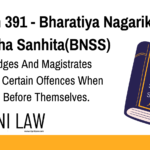Code: BNSS Section 400
Order To Pay Costs In Non-Cognizable Cases.
(1) Whenever any complaint of a non-cognizable offence is made to a Court, the
Court, if it convicts the accused, may, in addition to the penalty imposed upon him, order
him to pay to the complainant, in whole or in part, the cost incurred by him in the prosecution,
and may further order that in default of payment, the accused shall suffer simple imprisonment
for a period not exceeding thirty days and such costs may include any expenses incurred in
respect of process-fees, witnesses and advocate’s fees which the Court may consider
reasonable.
(2) An order under this section may also be made by an Appellate Court or by the
High Court or Court of Session when exercising its powers of revision.
Explanation:
Section 400 of the Bharatiya Nagarik Suraksha Sanhita (BNSS) deals with the payment of costs in non-cognizable cases, which are offenses that do not require an arrest or formal investigation by the police unless authorized by a magistrate. Non-cognizable offenses are generally less serious but still require legal action.
In situations where the accused is convicted for a non-cognizable offense, the Court has the discretion to order the accused to pay the complainant’s costs. This payment can cover various expenses the complainant incurred in pursuing the case, such as:
- Process fees (costs related to legal procedures),
- Witness expenses (compensation for individuals who testify),
- Advocate’s fees (legal representation costs).
If the convicted individual fails to pay these costs, the Court may impose a simple imprisonment sentence for up to 30 days as a penalty. This provision ensures that the complainant is not financially burdened by the costs of prosecution.
Additionally, this section grants the Appellate Court, High Court, or Court of Session the power to impose the same order during the appellate or revisionary process.
Illustrations:
Example 1: Payment of Costs in Non-Cognizable Offense
- Case: Person A files a complaint against Person B for a non-cognizable offense, such as defamation. The Court convicts Person B after a trial.
- Outcome: The Court orders Person B to pay Person A the costs incurred during the prosecution, which may include witness fees, advocate fees, and process fees.
Example 2: Default in Payment
- Case: After being convicted for a non-cognizable offense, Person C is ordered to pay costs of ₹500 to the complainant. However, Person C fails to make the payment within the stipulated period.
- Outcome: The Court may impose a sentence of simple imprisonment for up to 30 days if the amount remains unpaid.
Common Questions and Answers (Q&A):
Q1: What costs can the Court order the accused to pay in non-cognizable cases?
A1: The Court may order the accused to pay the complainant for various expenses, including process fees, witness expenses, and advocate’s fees that the complainant incurred during the prosecution of the case.
Q2: Can the accused be imprisoned for failing to pay the costs?
A2: Yes, if the accused does not pay the costs as ordered, the Court can impose simple imprisonment for up to 30 days.
Q3: Does this section apply to appellate or revision proceedings?
A3: Yes, an Appellate Court, High Court, or Court of Session can also order the accused to pay costs during the appellate or revision process.
Q4: How does the Court determine the amount of costs to be paid?
A4: The Court has the discretion to determine the reasonableness of the costs, which may include process fees, witness expenses, and advocate fees.
Q5: Is the payment of costs mandatory for every non-cognizable case?
A5: No, the payment of costs is at the discretion of the Court. It depends on whether the accused is convicted and whether the Court believes that the complainant is entitled to recover such costs.
Conclusion:
Section 400 of the Bharatiya Nagarik Suraksha Sanhita (BNSS) ensures that individuals pursuing justice in non-cognizable offense cases are not unduly burdened by the costs of prosecution. By allowing the Court to order the convicted individual to compensate the complainant for the costs incurred during the legal proceedings, the section provides a mechanism to alleviate the financial strain on the complainant.
This section also establishes that if the accused fails to pay the ordered costs, they may face a simple imprisonment penalty, serving as a deterrent to prevent delays or refusals in making payments.
Ultimately, Section 400 upholds the principle of justice by ensuring that legal proceedings are not financially oppressive for individuals seeking to address grievances related to non-cognizable offenses.








